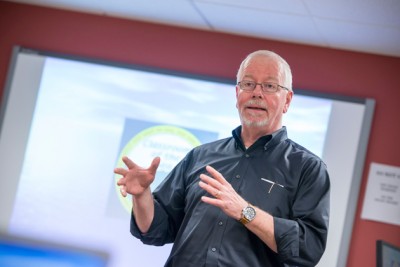
He’s been described by former students and colleagues as “a presence that truly inspires,” “king of the teachable moment” and among the top scholars in his field. Now, Educational Psychology Professor Scott W. Brown is also known as a UConn Board of Trustees Distinguished Professor.
Internationally known, Dr. Brown was one of three professors to recently receive this award, the highest honor given to a UConn faculty member. Economics professor Kathleen Segerson and sociology professor Nancy A. Naples were the other recipients.
Designed to recognize exceptional distinction in scholarship, teaching and service to both the university and community, the award to Brown represents “a body of 34 years of work” at UConn’s Neag School Education, which he could not have done alone.
“It’s an award I’ve always thought was far out of reach, because so much of the work I do is behind the scenes,” said Brown, who among other degrees holds a Ph.D. in psychology from Syracuse University. “I came to UConn as an assistant professor fresh out of grad school and never left, because every year I watched the university get better and better, until today it’s an international powerhouse. My colleagues and students are great, and over the years, UConn has allowed me to take advantage of opportunities and grow right along with it.”
A leader in learning and cognitive processing, Brown’s most recent accomplishments include work as one of the creators of the web-based GlobalEd2 (GE2) simulation program, which since 1998 has led to significant improvements in writing abilities, critical and scientific thinking, leadership and problem solving in the more than 13,000 middle schoolers from 14 states who’ve taken part in this interdisciplinary social studies game.
Also know for his work in Lyme disease education and scientific literacy in deaf and hearing impaired students, Brown’s research has led to him to write more than 120 scientific papers, three books and numerous abstracts and book chapters. He’s also presented at 250-plus conferences, advised 80 graduate students and, throughout his career, received more than $12 million in grants from the Centers for Disease Control and Prevention, National Science Foundation, U.S. Department of Education and other agencies.
However, to former Neag School of Education doctoral student Kimberly Lawless, why Brown has devoted his life to education is what’s most noteworthy.
“Everything he does is motivated by his desire and unwavering commitment to make the lives of students better,” said Lawless, co-facilitator of GE2 and chair of Educational Psychology at the University of Illinois – Chicago.
When Brown received tenure in 1986, he was praised for his enthusiasm, subject knowledge, communication skills and compassion, and described as a “gifted teacher.” To current Neag School Educational Psychology Department Head Del Siegle, all of these qualities are still true today.
“Dr. Brown doesn’t just teach how to effectively engage students, he does it. He walks the talk and practices what he preaches,” Siegle added. “And if he sees a better way for the university to do something, he’s willing to take risks and change practices. He has supervised innumerable independent studies to fill academic voids in students’ plans of study and, when a need arose, created new courses. His service to his field and UConn are unparalleled.”
A fellow of the American Educational Research Association and Association for Psychological Science, Brown’s service to UConn includes positions as director of the Teachers for a New Era project, director of the Bureau of Educational Research and Service and department head for Educational Psychology.
“When I look back and see the things that have helped make me successful, so many are linked to collaborations with colleagues in the Neag School and throughout the university,” said Brown. “What I’m most proud of, however, are the accomplishments of the students I’ve taught and worked with, particularly the exceptional graduate students I’ve watched grow into colleagues and established professors. I could work alone to move the field of educational psychology forward. But when all of us are working together, we can do so much more.”
 Facebook
Facebook
 Twitter
Twitter
 LinkedIn
LinkedIn
